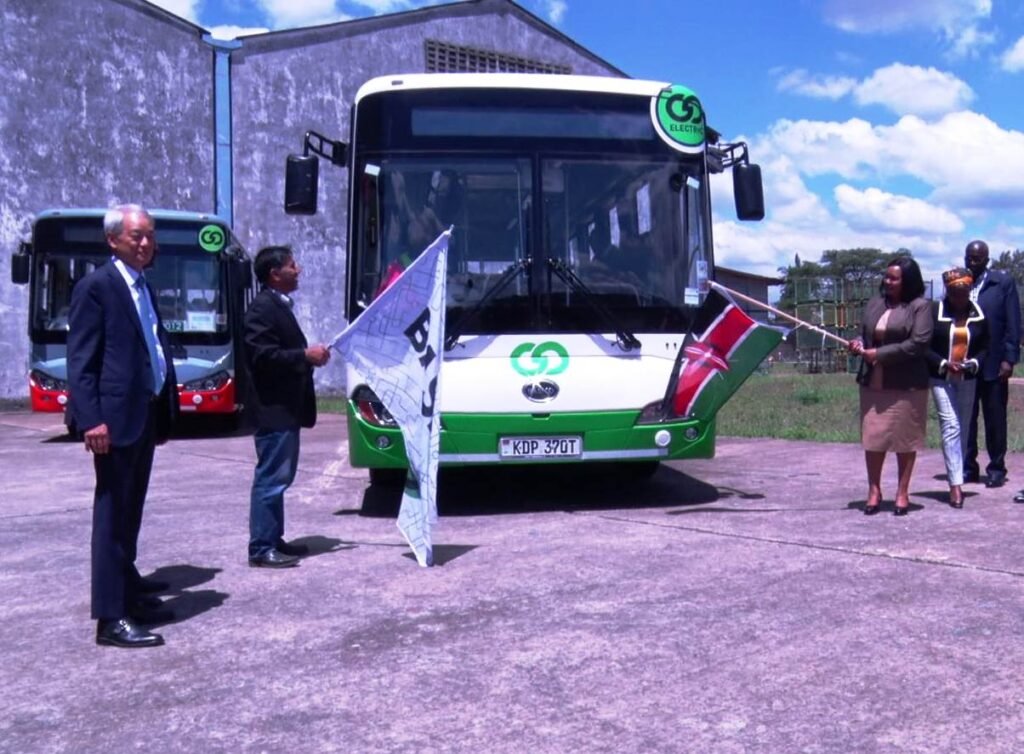By Muoki Charles
Industrialization Cabinet Secretary (CS), Rebecca Miano, has said that Kenya aims to fully transition to electric buses by 2027. This aligns with the government’s agenda to transform the transport sector by reducing carbon emissions and addressing the negative effects of climate change.
During the rollout of the country’s first lot of electric buses assembled by BasiGo Company in partnership with Kenya Vehicle Manufacturers (KVM) in Thika town on Tuesday, April 16, 2024, the CS stated that the Ministry has launched the Draft National Electric Mobility Policy, marking the beginning of the journey.
Miano said the policy proposes the establishment of incentives meant to increase the uptake of electric vehicles, including the reduction of excise duty on electric powered vehicles to 10 percent, as in the Finance Act, 2023.
Other efforts, she said, are the revision of the Integrated National Transport Policy (2009), to accommodate electric vehicles and the requisite infrastructure, as well as the development of an Automotive Policy, to stimulate the assembly and manufacture of vehicles, with a specific focus on electric vehicles.
”The Government recognizes the critical role that investment such as BasiGo plays in driving economic growth, creating employment opportunities and improving the livelihoods of our citizens. We have, therefore, prioritized the creation of a conducive business and investment environment, with robust policies, besides streamlining regulations and setting-up strategic incentives, aimed at attracting and retaining investors,” she said.
She added that the partnership between BasiGo and KVM, is Kenya’s first dedicated, high-volume assembly line, for modern electric buses.
“By March this year, BasiGo’s electric buses had driven over 1.5 million kilometers in Kenya, carried over 2.1 million passengers and side-stepped over 680 tons of greenhouse gas emissions,” she said.
- Nairobi’s electric vehicle battery swap revolution
- Kenya Power to assist in the uptake of electric cars
BasiGo CEO, Jit Bhattacharya, said the company intend to deliver 1,000 locally assembled electric buses in the next three years and create 300 green manufacturing jobs in Kenya.
“We shall be assembling 20 buses every month and the orders are many. We intend to work round the clock to increase the number, because the demand may rise with time,” said Bhattacharya.
Among the electric buses that were flagged-off on Tuesday are for Citi Hoppa and Super Metro bus Companies.
The Citti Hoppa CEO, Judy Thuo, welcomed the new buses, saying the fleet will improve the image of the Company and address customer demands of moving towards new technologies.
She welcomed the 2027 deadline of fully moving towards the use of electric buses, saying with the right policies, the timeframe is achievable.
“With the increased competition in the matatu industry, there is a need to rebrand and move with technology as demanded by the customers. We have ordered several electric buses and they will help us move the journey of customer satisfaction,” said Thuo.


